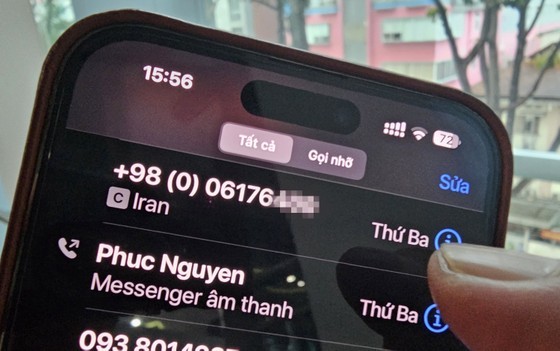 |
A fraudulent call from a virtual PBX with an international prefix (Photo: SGGP) |
Head of the Telecoms Authority Nguyen Thanh Phuc stated that during May and June this year, the Information and Communications Ministry (MIC) is going to cooperate with its Departments in all provinces and cities to inspect and handle any violations on mobile subscribing information.
The Authority of Telecommunications will direct telecoms businesses to continue certifying information of their own mobile subscribers in order to pinpoint and eliminate spam SIM cards as well as marketing calls. Simultaneously, the Authority will introduce systems to exploit AI, big data, and other advanced technologies to stop spam calls. Functional agencies will supply mobile users with effective tools to actively block those annoying calls from their end instrument.
Mr. Nguyen Thanh Phuc said that after certifying all subscribers’ information in accordance with the National Population Database, MIC is going to handle any subscribers who own from 10 SIM cards. These moves are expected to greatly influence the awareness of the public and contribute to deterring law violations through fraudulent calls and spam messages.
Sadly, the community has lately reported that there are calls with international prefix announcing the SIM card of receivers will have both calling and receiving functions locked in the near future. Receivers are asked to follow callers’ instruction to unlock.
Criminals in this case establish a virtual Private Branch Exchange with either a domestic or foreign prefix for their number. Alternatively, they can use a Voice over Internet Protocol service package to make a fraudulent call.
CEO of SafeGate Cyber Security Co. Ngo Tuan Anh warns that these criminals might even successfully attack a server from another country and turn it into a tool to make VoIP calls to scam people in Vietnam. Therefore, receivers should not follow any of their instructions.
MIC has adopted various measures to stop spam calls, including:
_Directing telecoms businesses to continue their task of certifying subscribers’ information and handling spam SIM cards
_Cooperating with the Public Security Ministry to pinpoint fraudulent calls
_Investigating and handling fake broadcast stations
_Introducing systems to block spam calls using AI, big data, and other advanced technologies
_Evaluating the implementation of those systems
Regarding technical solutions to detect and stop Deepfake calls, Deputy Head Tran Quang Hung of the Telecommunications Authority said that MIC first delivered warnings to the community via the media about this dangerous trick. Following that, MIC and major corporations, organizations are urgently seeking effective ways to stop those calls. MIC asked that the press actively spread news and warnings on this matter so that the public can raise their awareness and protect themselves.
























